» The mid-year climate change conference will take place from June 16 to 26, 2025 in Bonn, Germany.
» The 30th Conference of the Parties to the U.N. Framework Convention on Climate Change (UNFCCC COP30) will be held in Belem, Brazil, from November 10 to 21, 2025.
This year, at UNFCCC COP30 in Belem, representatives from nearly 200 countries will seek to fulfill ambitious climate financing goals and accelerate national action on climate change to achieve the goals of the 2015 Paris Agreement. Leading up to COP30, the mid-year climate conference (SB 62) in Bonn, Germany is an important opportunity to build momentum with international stakeholders and negotiators.
Conservation International’s policy position paper for the mid-year climate conference in Bonn (SB62) will be available here in English, French and Spanish, please check back soon!
PRESS CONTACT
Jessica Brown, Senior Director of Media Relations
See our latest news and press releases at conservation.org/newsroom.
Mid-Year Climate Change Conference in Bonn
U.N. Framework Convention on Climate Change mid-year conference (SB 62)
Learn more about this session on the UNFCCC website »
U.N. Framework Convention on Climate Change COP 30 – Baku
Learn more about this session on the UNFCCC website »
The Conference of the Parties (COP) refers to the annual meeting of the 197 parties of the 1992 United Nations Framework Convention on Climate Change (UNFCCC).
At the mid-year climate conference in Bonn, Conservation International will engage with key decision-makers and global stakeholders to advance discussions and implement commitments made in previous climate conferences — and help set the groundwork for COP30 to accelerate climate action by governments and the private sector.
Conservation International’s engagement focuses on elevating the role of nature-based solutions to climate change — such as protecting forests, mangroves and peatlands — to limit global warming and help communities adapt to climate change. During formal negotiations in Bonn, Conservation International will advise countries on the need to accelerate support and incentives for nature-based solutions for climate action. The critical role of nature should be reflected in all negotiation topics under the Paris Agreement, especially on climate ambition through nationally determined contributions (NDCs), adaptation and the mobilization of transformational finance. This includes international cooperation mechanisms such as Article 6, which outlines how countries can work together on the vital task of reducing carbon emissions.
Conservation International coordinates with partners representing diverse sectors to galvanize action on these issues — both in and outside of the negotiation rooms.
Natural climate solutions, which are essential to achieving the Paris Agreement’s goals, provide opportunities for countries to increase their climate ambition; they must be part of countries’ NDCs and complementary Paris Agreement mechanisms. Harnessing the full potential of nature to mitigate climate change — and help communities adapt to its impacts — is critical to the success of the Paris Agreement.
This year’s UN climate change conference will aim to galvanize the needed ambition, finance and leadership to address climate change in this critical decade. Discussions will focus on whether 2025 NDCs will collectively keep humanity on track to meet the Paris Agreement’s goals, as well as on the mobilization of climate finance through the Baku-Belem Roadmap to $1.3 Trillion. Parties will make important decisions to move the Global Goal on Adaptation from concept to action. This includes approving a new framework to guide how countries measure and strengthen resilience to climate impacts. They will also provide guidance to the ongoing work from the technical body which is developing standards for projects and programs to be eligible to the UN-centralized carbon crediting mechanism under Article 6.4 of the Paris Agreement.
Our approach
Conservation International helps countries achieve the goals of the Paris Agreement through conserving, restoring and sustainably managing nature by providing policy recommendations, scientific models, tools and funding platforms for implementing natural climate solutions at scale. We envision a world where nature’s contribution to addressing climate change is maximized — meaning natural climate solutions are implemented to their fullest potential for mitigating climate change — and are also fully deployed in places where ecosystems can help vulnerable populations adapt to the already-present and future effects of climate change.
We work alongside Indigenous Peoples and Local Communities to achieve the Paris Agreements’ goals, as they are the stewards of lands that contain almost a quarter of the world’s land-based carbon and are on the front lines of climate change. To recognize the importance of these stakeholders, our policy advocacy works to connect Indigenous peoples and local communities to funding, training and technology and raise their voices under the ongoing negotiations.
Protecting, sustainably managing and restoring natural ecosystems such as forests and wetlands can provide at least 30 percent of the global action needed to limit average temperature rise to 1.5 degrees Celsius (2.7 degrees Fahrenheit). Yet nature conservation currently receives only 3 percent of global climate finance. The financing gap for climate mitigation needed in the agriculture, forestry and other land use sectors is larger than the financing gap to mitigate climate change in other sectors (energy, transport and industry) — and does not account for the billions of dollars that continue to flow into practices that destroy nature and drive greenhouse gas emissions. Estimates show nature-related climate action requires between about US$ 100-300 billion a year in funding — about 10 to 30 times what’s currently available — to meet the Paris Agreement’s targets. Through our policy advocacy and engagements with public and private sector we aim to narrow this gap to ensure nature’s potential is unleashed.
As we passed the 1.5 degree warming threshold for the first time in 2024, this is a critical time for countries to update and accelerate the implementation of their Nationally Determined Contributions — their targets for achieving the Paris Agreement — and for the international community to provide additional technical and financial support.
While some countries have taken steps toward increasing their ambition to address climate change, more ambition, action and finance are needed to prevent the most dangerous impacts of climate change and ensure that communities can adapt.
While progress has been made in enhancing climate ambitions and securing implementation support, stronger targets, more decisive actions and increased financial resources are still needed. These steps are vital to mitigating severe climate impacts and helping communities adapt effectively. The actions we take now will profoundly shape our climate future.
OUR POLICY OBJECTIVES FOR THE 2025 MID-YEAR CLIMATE NEGOTIATIONS
Conservation International works to equip decision makers with accessible, policy-relevant science to restore and protect critical ecosystems as part of global climate action.
At the UNFCCC mid-year climate conference in Bonn, Conservation International will strive to advance the role of nature in implementing the Paris Agreement in several priority areas, including adaptation, non-market approaches, inclusive participation of Indigenous Peoples and local communities, the ocean-climate nexus, and climate-biodiversity synergies. Check back soon for our full policy recommendations!
Publications

COP 29 Outcome Report

Policy Recommendations to Advance Nature-Based Solutions at UNFCCC COP29

Recommandations Politiques Pour Faire Avancer les Solutions Fondees sur la Nature a la COP29 de la CCNUCC

Recomendaciones de Politica para Avanzar las Soluciones Basadas en la Naturaleza en la COP 29 de la CMNUCC

Rekomendasi Kebijakan Untuk Mendorong Solusi Berbasis Alam Di UNFCCC COP29

Article 6 - Explainer for COP29

Policy Recommendations for REDD+ Nesting

Recomendaciones de Politicas para el Anidamiento de REDD+

Recommandations politiques pour l'imbrication de la REDD+

Recomendacoes de Politicas para Aninhamento de REDD+

Rekomendasi Kebijakan untuk Pengintegrasian REDD+
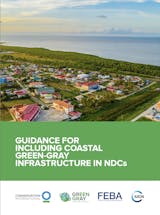
Guidance for Including Green-Gray Infrastructure in NDCs
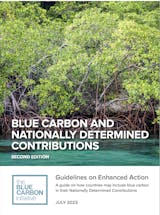
Blue Carbon and Nationally Determined Contributions (Second Edition)
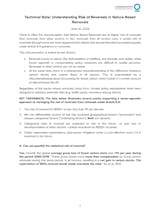
Technical Note: Understanding Risk of Reversals in Nature Based Removals

SB 60 Policy Recommendations (English)

SB 60 Policy Recommendations (Spanish)

SB 60 Policy Recommendations (French)

SB 60 Policy Recommendations (Bahasa Indonesia)
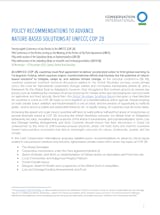
Policy Recommendations to Advance Nature-Based Solutions at UNFCCC COP 28
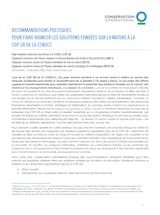
Policy Recommendations to Advance Nature-Based Solutions at UNFCCC COP 28 (French)
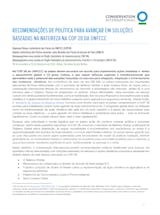
Policy Recommendations to Advance Nature-Based Solutions at UNFCCC COP 28 (Portuguese)
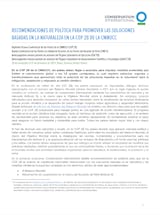
Policy Recommendations to Advance Nature-Based Solutions at UNFCCC COP 28 (Spanish)
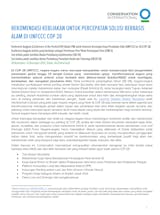
Policy Recommendations to Advance Nature-Based Solutions at UNFCCC COP 28 (Indonesian)
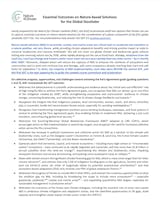
Essential Outcomes on Nature-based Solutions for the Global Stocktake

Technical Note: Understanding Risk of Reversals in Nature Based Removals
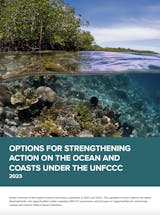
UNFCCC Ocean Climate Options 2023
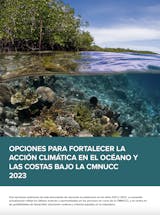
OPCIONES PARA FORTALECER LA ACCIÓN CLIMÁTICA EN EL OCÉANO Y LAS COSTAS BAJO LA CMNUCC 2023
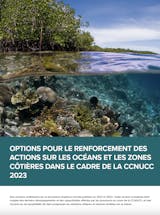
OPTIONS POUR LE RENFORCEMENT DES ACTIONS SUR LES OCÉANS ET LES ZONES CÔTIÈRES DANS LE CADRE DE LA CCNUCC 2023




